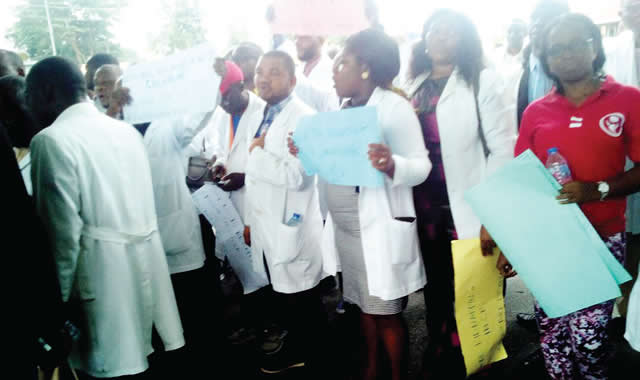The Nigerian Association of Resident Doctors and the Joint Health Sector Unions disagree with the Federal Government’s decision to stop health workers from taking time off to go abroad.
NARD and JOHESU think the government should focus on fixing the reasons why health workers leave the country for better opportunities, which is commonly referred to as Japa.
The Minister of State for Health, Dr. Tunji Alausa, recently announced that health workers planning to move abroad for better opportunities must resign before they leave.
Alausa stated that it's no longer acceptable for health workers to apply for time off and then move to another country for better opportunities.
The minister mentioned that the ban on time off for health workers is based on an Executive Order from President Bola Tinubu, as part of efforts to address the problem of brain drain, also known as ‘Japa’, in the nation’s health sector.
However, the President of NARD, Dr Dele Abdullahi, and the National Chairman of JOHESU, Dr Kabiru Minjibir, said in separate interviews with The PUNCH on Tuesday, that the government's directive is a rushed and short-term approach to dealing with the problem of health workers leaving the country.
While the NARD president appreciates the efforts of the Federal Ministry of Health and Social Welfare to protect the health sector, he suggests that the ministry lacks proper information on how to retain professionals within the system.
“Healthcare workers, like other civil servants, are governed by the civil service rule, and healthcare workers leaving the country do not take time off, most of them resign or leave without permission. It’s mostly the ones going abroad for training who take time off. If you stop everyone from taking time off, does that mean healthcare workers can’t go for training in the country?
I understand the reasoning behind this because various reasons have been given for the shortage of healthcare workers in the country, which are not accurate. They say they want to increase the recruitment of health workers, but have they looked at the actual numbers of new recruits in the last two years and how many of them are still in the system?
“You say you want to increase the number of medical students, but have you considered the training capacity of these institutions and the quality of graduates? I think the ideas are good, but they need more research, and the key stakeholders are not being consulted. If we continue like this, we won’t make any progress,” he said.
Abdullahi emphasized that the government needs to address the reasons driving healthcare workers to leave the country.
“The countries attracting them want them because they are skilled and they know it. Currently, a dental medical practitioner was kidnapped in Abuja. Three months ago, a doctor was kidnapped in Kaduna. The cost of living has gone up, security is weak, power supply is unreliable, and the facilities we work in are below standard. Every week, there are assault cases in hospitals. At the Nnamdi Azikiwe Teaching Hospital, Nnewi, a nurse was severely beaten by a patient’s relative because they lost a family member.
“Most of the doctors in the university are poor, and most of them don’t receive allowances. There is also the issue of not being paid our overdue payments, and the fact that our salaries are low. So, all of these are the factors we need to deal with.
“Payment is the main factor causing people to leave. The stakeholders need to be involved to examine the reasons for people leaving,” the NARD president said.
Similarly, JOHESU leader, Minjibir, said the government needed to address the health workers’ requests to prevent the emigration of skilled workers.
He said, “We do not support the minister’s statement because what they need to do to tackle brain drain is to address the issues on the ground, and not to be issuing provocative statements.
“We have made our points that what causes brain drain is the issue of not implementing the specified allowances, the salary is unsatisfactory, the working conditions for health workers are very poor, and they should provide the necessary equipment for health workers. So, let them handle the issues so that health workers can stop traveling abroad to seek better opportunities.”



